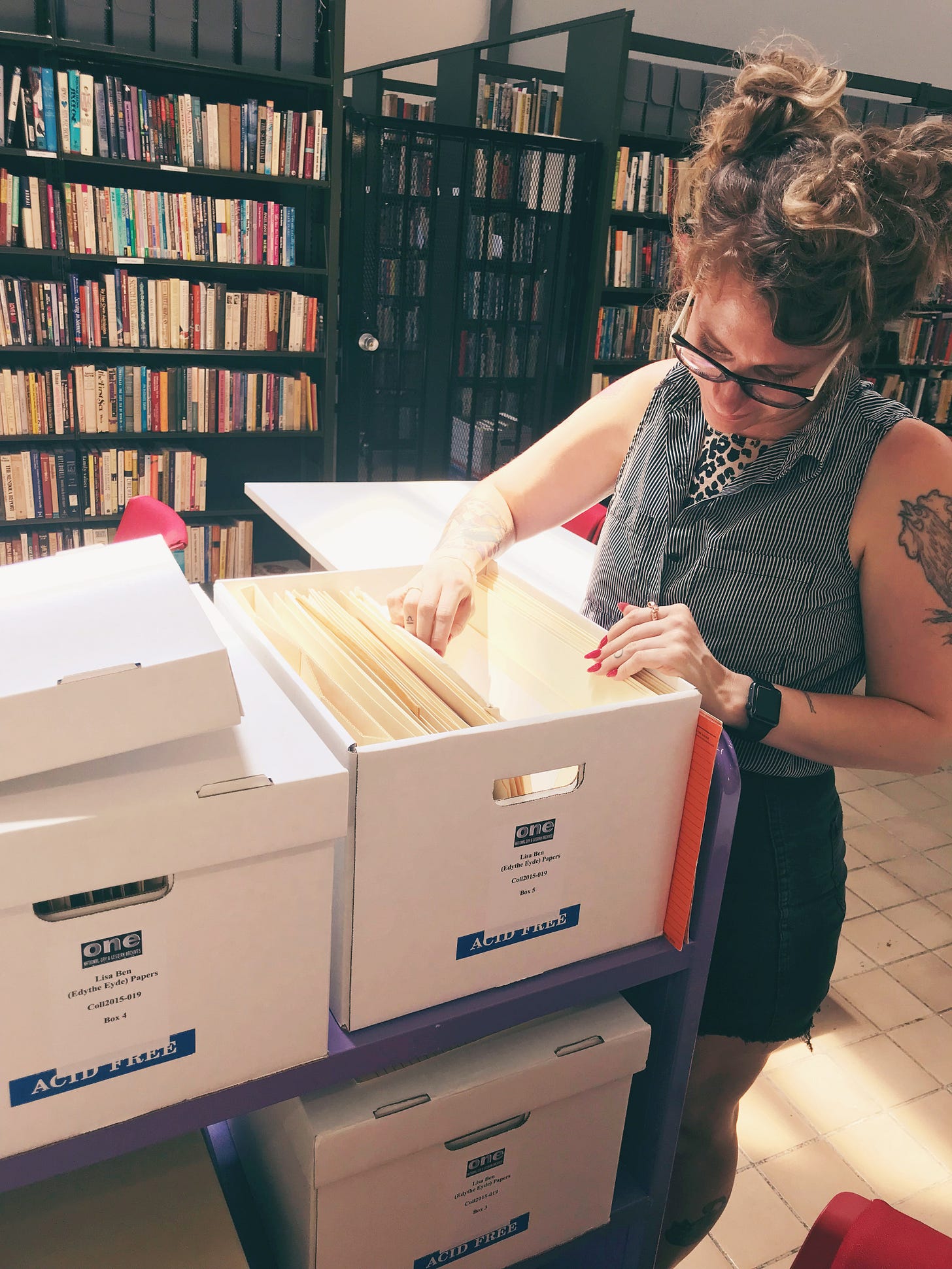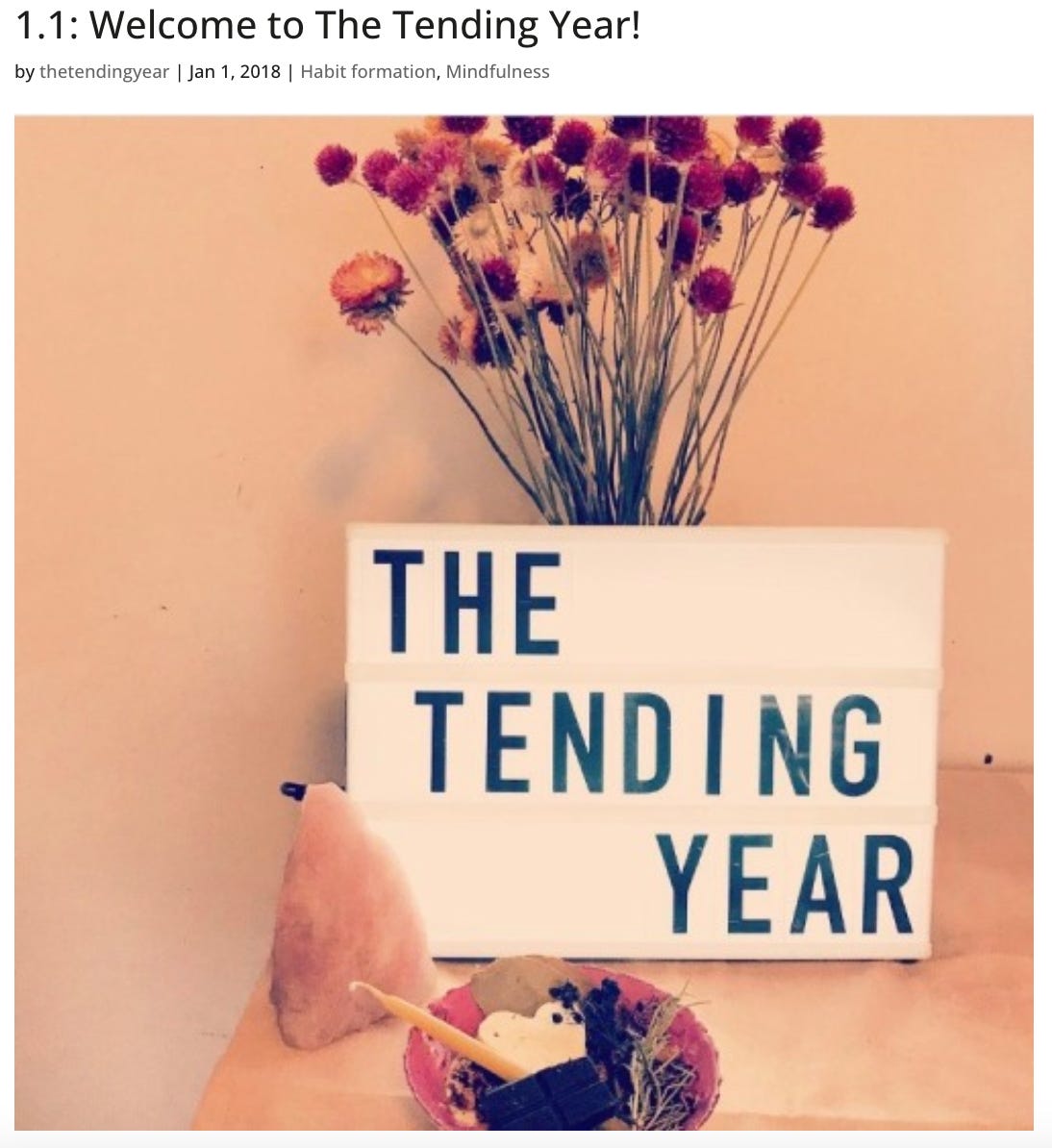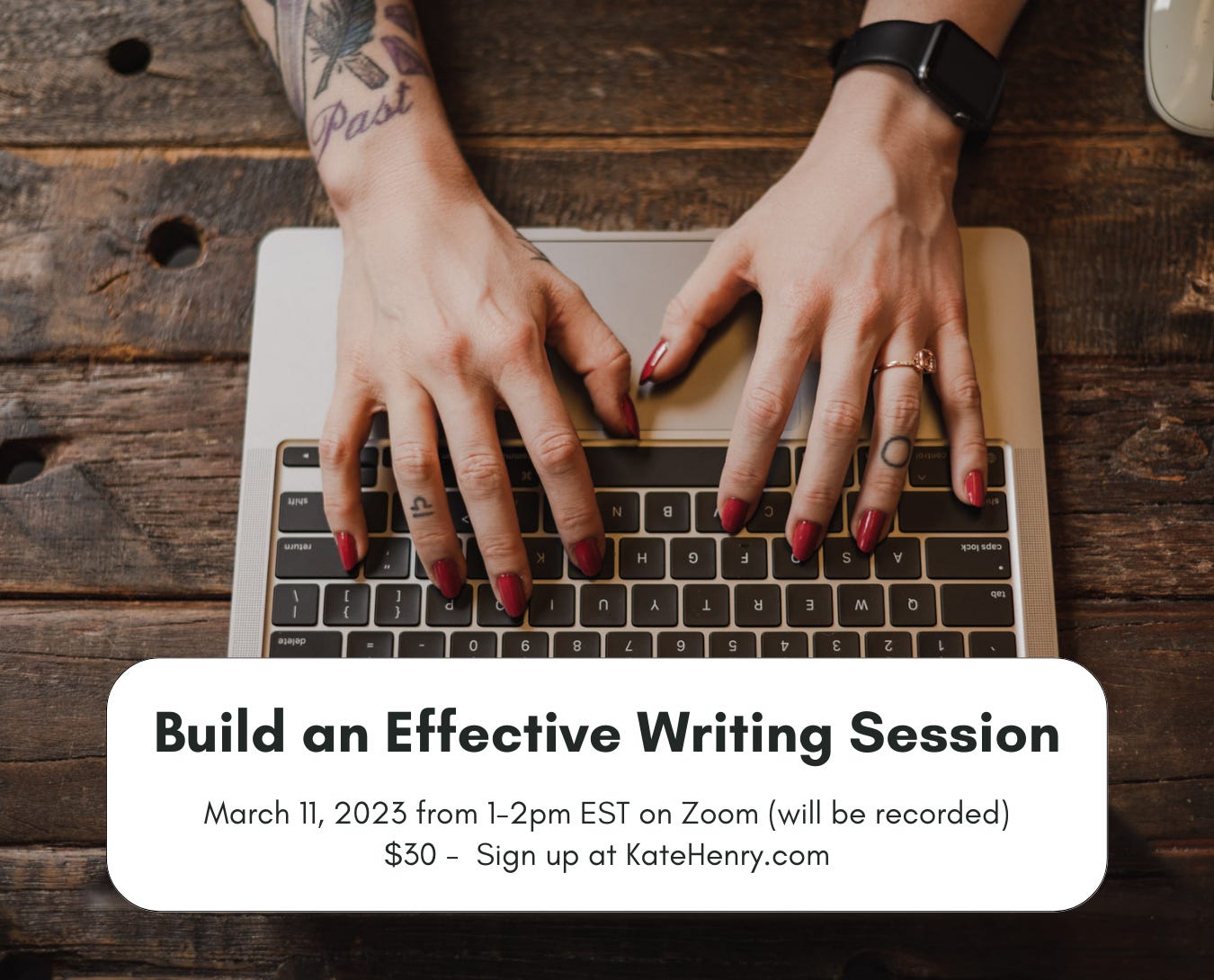You can listen to an audio version of this newsletter above. Please note that this is unedited and I’m recording in my home office, so you may hear some meows, raindrops, or traffic in the background. Also note that I mistakenly said “sharing” instead of “showing” around 7:40.
I’m running a Build an Effective Writing Session workshop this Saturday the 11th from 1pm-2pm EST on Zoom. You can learn more about the workshop and sign up here. I created this workshop as a way improve my own writing practices using time management, focus, and prioritization tools, and I’m thrilled to share my process with you. I hope you’ll join me, and if you can’t attend live, please sign up anyways because I’ll share a recording!
Welcome to my first official Substack letter!
Free subscribers will receive at least two letters a month and paid subscribers will have access to those same letters + subscriber-only content, a monthly Q&A, 10% off coaching packages, and a monthly co-working session. Consider upgrading to a paid subscription for $5 a month below.
Hi, I’m Dr. Kate Henry (née Litterer) and I’m an independent scholar.
In 2017, I relinquished my pursuit of a tenure track professorship, the career I’d been priming myself for since my 10th grade Honors English class.
I spent almost two decades diligently crossing and dotting my t’s and i’s: high school poetry summer camps, double major in Creative Writing and Literature in undergrad, MFA in Poetry, MA and PhD in Rhetoric and Composition, and a Graduate Certificate in Feminist Studies to boot. I published a scholarly journal article and a book of poetry with a small press. I was the “right” kind of perfectionist (quirky rule-follower) and I had a paper trail to prove it.
Then came 2017. A lifetime of blurring my worth with my accolades went up in flames when I developed severe back pain and what I would later discover was chronic illness. Workaholism that had previously fueled my productivity became untenable and the 10-hour workdays and 7-day workweeks I had taken for granted were ripped away. Instead, they were replaced with doctors’ appointments and refocusing my limited energy on taking care of myself.
My obsession with a tenure track professorship dissipated. As much as I loved teaching and researching, I realized that life in traditional academia, where overwork is expected and workaholism is praised, was not only inaccessible but no longer appealing. (If you resonate with this, you might find some relief and validation from the Work Appropriate podcast episode, “My Industry is Failing: Academia Edition”).
Luckily, I was passionate about my dissertation topic (Lisa Ben, the woman who wrote the first lesbian magazine in the U.S.) and wanted to finish it for knowledge and fascination’s sake. While my colleagues stressed about job application materials, I chipped away at my chapters and slowly laid my exit route.

In an effort to develop a healthier relationship with work, I leaned into what I knew how to do—research and write. When I wasn’t working on Lisa Ben research, I pored over podcasts, blogs, and books on personal development, productivity, and slow living. I journaled. I experimented with the tools I was learning and recorded my findings. My perspective on productivity shifted and I noticed incremental yet positive changes to my life.
At that point, I offered myself an ultimatum. If I researched and blogged weekly for a whole year about my newfound fascinations and their effects on my life, then I would grant myself permission to explore the new path I couldn’t get out of my mind: a coaching business where I helped other folks like me. On January 1, 2018, I launched my blog “The Tending Year,” a play on the dual meaning of tend to (taking responsibility or care of something) and tend to do (developing habitual actions or beliefs).

My single Tending Year turned into two years of weekly experiments and blogging, I finished my PhD, and I launched my coaching business in 2020. Since then, I’ve supported overwhelmed academics through 1-on-1 coaching, workshops, courses, and my book, Tend to It: A Holistic Guide to Intentional Productivity. You can learn more about my work at katehenry.com.
Why Refocus on Independent Scholarship Now?
I’m not a traditional academic tied to a particular university, but I remain a scholar. More specifically, I’m a rhetorician who specializes in rhetorical circulation, studying the ways discourse influences folks to think or act in particular ways. The scholarly term I used for this in grad school was “rhetorical education,” or an investigation of where, when, by/to whom, why, and how ideas are presented. Rhetoric is often defined as the art of persuasion. This is important to me (and might be important to you, too) because people can use rhetoric to influence other people to develop beliefs and take action.
That idea isn’t new. Advertising agencies use rhetoric to imply that a certain drink or makeup or car or vacation will improve a buyer’s life. But rhetorical education can be dangerous, resulting in hateful ideologies and harmful actions, which is why I think it’s important to study.
Real life example. Anti-trans bills are being passed across the U.S., fueled by similar scare tactics that I saw in my studies of the ways newspapers used anti-homosexual terminology in the 1940s. These ideas don’t pop up over night: they are generated and circulated in spaces we might expect, like conservative FOX News, and also spaces we may not expect, like “unbiased” The New York Times. The Times recently published an article praising J.K. Rowling (who regularly spouts violent anti-trans rhetoric) the day after journalists, media experts, and readers wrote an open letter asking the Times to review their problematic reporting on trans children and adults. The letter notes that “the Times has in recent years treated gender diversity with an eerily familiar mix of pseudoscience and euphemistic, charged language, while publishing reporting on trans children that omits relevant information about its sources.” The Times’s decision to publish a pro-Rowling piece the day after the letter was a rhetorical choice in itself.

Often, when academics share their specialized interest, they use academic jargon as a way to garner cultural capital and credibility. One of my grad school friends called this “showing your knowledge.” I’m more interested in sharing my knowledge. This is why I created LisaBenography.com after I graduated as an ongoing project where I’ll share my dissertation research for free and sans-jargon for folks to access.
My hope is that tending will serve a similar purpose, but looking at topics like productivity, knowledge work, academia, slow living, accessibility, and more. My plan is to post at least twice a month, more if I’m feeing inspired. If you want to upgrade to a paid subscriber for $5 a month, you can access some extra perks: a monthly Q&A, 10% off coaching packages, and co-working sessions. If you remain a free reader, I’m thankful for you, too!
Curiosities
This section of my letters is for things that made me say “hmmm” or “wow!” recently.
“The Marriage Lesson that I Learned Too Late” by Matthew Fray. Tender reflections on the slow separation of a husband and wife that has inspired me to finally spend 10 seconds breaking down cardboard boxes before I put them in the recycling (a request Kris has been making for 6 years that I previously ignored).
The You’re Wrong About episode about Napster. It was cool to learn the history of Napster’s rise and fall, because I certainly wasn’t thinking about that (or the ethics of circulating music without paying artists) when I was 13, waiting two days for a Blink 182 song to download to the family desktop.
For Your Consideration
Follow me on Instagram
My offerings: 1-on-1 Coaching and workshops and IPSP
Sign up for the waitlist for Perceptible Progress: A Goals Course
Order my book, Tend to It: A Holistic Guide to Intentional Productivity
Listen to my podcast interviews
Read newsletter archive (coming soon!)
Take care and talk soon,
Dr. Kate










I'm so excited to read more of Tending (great name!)! I love how Substack has become a space for academics to share ideas more widely and without the brutal constraints of academic publishing. I think you'll do very well here :)
I love the sound of this! Thank you for sharing your story. The blending of academia with productivity and slow living, as well as she sharing of knowledge, sounds great. Can't wait to see where you go with this : )
Also, I didn't know that about The New York Times; that is really disappointing, thank you for sharing. I live in the UK, but the rhetoric around these issues is sadly the same at the moment.